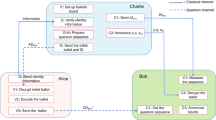Abstract
As an important topic of quantum cryptography, quantum voting has attracted more and more attention in recent years. In this paper, we propose a quantum voting scheme based on a new set of orthogonal product states. Since different particles in the same orthogonal product state are transmitted separately, the security of the vote message in the scheme can be protected. The availability and security analysis show that the scheme satisfies the basic properties of voting can resist known quantum attacks. Furthermore, our scheme solves the problem of difficult preparation of entangled states in actual situations and improves the practicability of voting scheme. We hoped that our research will provide new ideas for the further study of quantum voting.



Similar content being viewed by others
References
Naseri, M., Gong, L.H., Houshmand, M., Matin, L.F.: An anonymous surveying protocol via greenberger-horne-zeilinger states. Int. J. Theoretical Phys. 55(10), 4436–4444 (2016)
Shor, P.W.: Polynomial-time algorithms for prime factorization and discrete logarithms on a quantum computer. SIAM J. Comput. 26(5), 1484–1509 (1997)
Grover, L.K.: Fast quantum mechanical algorithm for database search. Twenty-eighth ACM Symposium on Theory of Computing, pp. 212–219 (1996)
Hillery. M., Ziman, M., Bužek, V., et al.: Towards quantum-based privacy and voting. Physics Letters A 349(1-4), 75–81 (2006)
Vaccaro, J.A., Spring, J., Chefles, A.: Quantum protocols for anonymous voting and surveying. Physical Review A 75(1), 10064–10070 (2005)
Horoshko, D., Kilin, S.: Quantum anonymous voting with anonymity check. Physics Letters A 375(8), 1172–1175 (2011)
Bonanome, M., et al.: Toward protocols for quantum-ensured privacy and secure voting. Physical Review A 84(2), 290–296 (2011)
Hillery, M.: Quantum voting and privacy protection: first steps. Spienewsroom (2006)
Vaccaro, J.A., Spring, J., Chefles, A.: Quantum protocols for anonymous voting and surveying. Physical Review A 75(1), 012333 (2007)
Wang, Q.L., Yu, C., Gao, F., Qi, H., Wen, Q.: Self-tallying quantum anonymous voting. Physical Review A 94(2), 022333 (2016)
Cao, H.J., Ding, L.Y., Yu, Y.F., Li, P.F.: A electronic voting scheme achieved by using quantum proxy signature. Int. J. Theor. Phys. 55(9), 4081–4088 (2016)
Thapliyal, K., Sharma, R.D., Pathak, A.: Protocols for quantum binary voting. International Journal of Quantum Information 15(01), 1750007 (2017)
Zhang, J.L., Xie, S.C., Zhang, J.Z.: An elaborate secure quantum voting scheme. International Journal of Theoretical Physics 56, 3019–3028 (2017)
Zhang, J.L., Zhang, J.Z., Xie, S.C.: A choreographed distributed electronic voting scheme. International Journal of Theoretical Physics 57, 2676–2686 (2018)
Zhang, K.J., Song, T.T., Zuo, H.J., Zhang, W.W.: A secure quantum group signature scheme based on Bell states. Physica Scripta 87(4), 045012 (2013)
Zhang, K.J., Sun, Y., Song, T.T., Zuo, H.J.: Cryptanalysis of the quantum group signature protocols. Int. J. Theor. Phys. 52(11), 4163–4173 (2013)
Zhang, K.J., Zhang, W.W., Li, D.: Improving the security of arbitrated quantum signature against the forgery attack. Quantum Inf. Process. 12 (8), 2655–2669 (2013)
Zhang, K.J., Qin, S.J., Sun, Y., Song, T.T., Su, Q.: Reexamination of arbitrated quantum signature: the impossible and the possible. Quantum Inf. Process. 12(9), 3127–3141 (2013)
Zhang, K.J., Li, D., Su, Q.: Security of the arbitrated quantum signature protocols revisited. Physica Scripta 89(1), 169–174 (2014)
Sun, H.W., Zhang, L., Zhang, K.J., Wang, Q.L., Cai, X.Q.: The Security problems in some novel arbitrated quantum signature protocols. Int. J. Theor. Phys. 56, 2433–2444 (2017)
Yang, Y.G., WEN, Q.Y., ZHU, F.C.: An efficient quantum secret sharing protocol with orthogonal product states. Science in China Series G: Physics, Mechanics Astronomy 50(3), 331*338 (2007)
Li, X.Y., Zhao, Q.Y.: Determined key distribution protocol using orthogonal product states. Applied Mechanics Materials 278-280, 1799–1803 (2013)
Jiang, DH, Wang, J, Liang, XQ, et al.: Quantum voting scheme based on locally indistinguishable orthogonal product states[J]. International Journal of Theoretical Physics 59(12) (2019)
Jiang, DH, Hu, QZ, Liang, XQ, et al.: A trusted third-party e-payment protocol based on locally indistinguishable orthogonal product states[J]. International Journal of Theoretical Physics 59(6) (2020)
Halder, S, Banik, M, Agrawal, S, et al.: Strong quantum nonlocality without entanglement. Phys. Rev. Lett. 112(4), 040403.1–040403.7 (2019)
Bennett, C.H.: Quantum cryptography using any two nonorthogonal states. Phys. Rev. Lett. 68(21), 3121 (1992)
Goldenberg, L., Vaidman, L.: Quantum cryptography based on orthogonal states. Phys. Rev. Lett. 75(7), 1239–1243 (1995)
Long, G.L., Liu, X.S.: Theoretically efficient high-capacity quantum-key-distribution scheme. Physical Review A 65(3) (2002)
Shor, P.W., Preskill, J.: Simple proof of security of the bb84 quantum key distribution protocol. Phys. Rev. Lett. 85(2), 441–444 (2000)
Inamori, H., Lutkenhaus, N., Mayers, D.: Unconditional security of practical quantum key distribution. European Physical Journal D 41(3), 599–627 (2007)
Lo, H.-K.: A simple proof of the unconditional security of quantum key distribution. Journal of Physics A: Mathematical and General 34(35), 6957–6967 (2001)
Wang, Q., Das, S., Wilde, M.M.: Hadamard quantum broadcast channels. Quantum Inf. Process 16(10), 248 (2017)
Acknowledgements
This work was funded by the National Natural Science Foundation of China under Grant (No.61932005), National Natural Science Foundation of China under Grant No. 61802118, Natural Science Foundation of Heilongjiang Province under Grant No.YQ2020F013 and No.LH2019F031 and No.JJ2019LH1770, University Nursing Program for Young Scholars with Creative Talents in Heilongjiang Province under Grant No. UNPYSCT-2018015, Open Foundation of State key Laboratory of Networking and Switching Technology (BUPT) under Grant No. SKLNST-2018-1-07, the Special Funds of Heilongjiang University of the Fundamental Research Funds for the Heilongjiang Province (RCCXYJ201812).
Author information
Authors and Affiliations
Corresponding author
Additional information
Publisher’s Note
Springer Nature remains neutral with regard to jurisdictional claims in published maps and institutional affiliations.
Rights and permissions
About this article
Cite this article
Du, G., Zhou, BM., Ma, CG. et al. A Secure Quantum Voting Scheme Based on Orthogonal Product States. Int J Theor Phys 60, 1374–1383 (2021). https://doi.org/10.1007/s10773-021-04763-7
Received:
Accepted:
Published:
Issue Date:
DOI: https://doi.org/10.1007/s10773-021-04763-7




